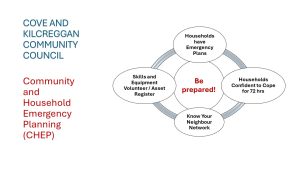SEPA Floodline and Material on Being Prepared for flooding
|
|
|
|
Given the rise of flooding in the area please see the Argyll & Bute web page regarding flooding. If you scroll down you will also find useful information about the roles and responsibilities of different organisations, land-owners and householders. This is worth a read as many people are not aware of their responsibilities regarding above / below ground drainage and the need to keep clear, not to divert and related issues.
BEING FLOOD AWARE (EVEN IN DRY PERIODS) CAN REDUCE RISKS IN THE AREA.
Thank you to all the volunteers and residents who attended the event on the 13th January. It was an interesting event with many suggestions, points to note in relation to hazards, volunteers willing to assist and a point about post recovery support as well.
We are pleased to note the interest and engagement of our MP (Brendan O’Hara) who lives locally and so faces some of the same challenges as the rest of the residents on the Peninsula!!
Next steps:
For major widespread weather events we are focusing on building the ability and confidence of ‘Households to Cope’ along with a ‘Know Your Neighbours’ Network and a Skills / Assets register for volunteers.
Outline approach for Cove and Kilcreggan Community Council

For Interim basic information which should be modified to suit your household needs:
Please see material on Ready Scot: https://ready.scot/
Suggested First Aid Kit:
Suggested Emergency Kit:
Preparing for Rain and Flooding
Given the recent events and on-going storm forecasts the following advice sheet is now available:
https://ready.scot/respond/severe-weather/rain-and-flooding
We acknowledge a grant for up to £1,150 from the National Centre for Resilience at the University of Glasgow (https://www.gla.ac.uk/research/az/ncr/ ) to support this work. Outline approach for Cove and Kilcreggan Community Council